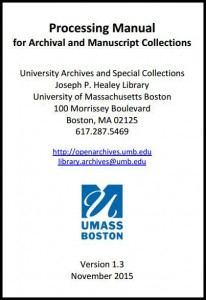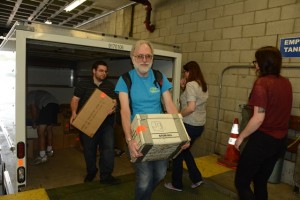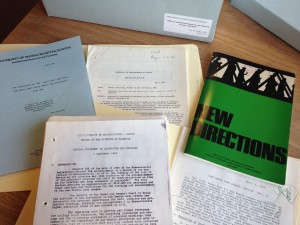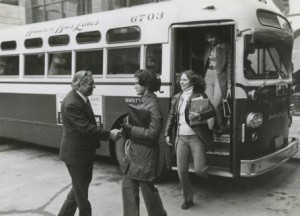The WUMB-FM collection is now open and available for research. This collection, one of the largest in University Archives & Special Collections at UMass Boston, documents the administration and operation of the WUMB radio station at the university from 1969 through 2012. 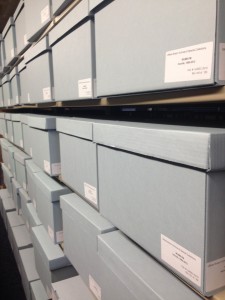
WUMB was founded in the fall of 1968 by a group of undergraduate students in the basement of the Sawyer building at 142 Berkeley Street in Back Bay, near UMass Boston’s original Park Square campus. The founding group wanted to provide a radio service that was not available elsewhere, and discussed offering not only music but talk shows.
On October 31, 1968, students formed the Radio Station Committee of UMass Boston and drafted a constitution. The committee consisted of a chairman, vice-chairman, treasurer, and secretary, which were elected each April. Pat Riccio (Monteith), interested in getting involved in university activities as a freshman and a member of the radio station’s founding group, would serve as treasurer, secretary, music director, and, finally, as general manager until 2012.
The station began as a closed-circuit station called WUMB-AM and went on the air for the first time on December 14, 1969. By 1970, it was broadcast within the cafeteria on campus on Monday through Friday from 8:30 am to 4:00 pm, except during vacations, reading periods, and exams.
On June 30, 1980, the station received the last Metro-Boston area FM license from the Federal Communications Commission and became UMass Boston’s official non-commercial radio station. On September 19, 1982, WUMB officially went on the airwaves with an all-student and volunteer staff, broadcasting to an audience of 1.5 million people. The license was received after years of numerous amendments and resubmittals of lost information, as well as some objections from other commercial and non-commercial radio stations in the area. The license was made possible with support from Chancellor Carlo Golino and his chief of staff, who was an attorney, advocating for the radio station in written letters. Read more about the history of WUMB-FM in the historical note section on page two of the finding aid.
The WUMB-FM collection includes original and photocopied documents, official records (constitution, minutes, by-laws), mimeograph copies, Ditto copies, notes and correspondence, playlists, program guides, surveys, listener correspondence, performance agreements, newspaper articles, lyrics, promotional materials, photographs, contact sheets, slides, negatives, CDs, cassettes, VHS tapes, and more.
Some digitized reel-to-reel audio from the WUMB collection is available through the American Archive of Public Broadcasting (WUMB and UMass Boston are listed among the America Archive’s participating organizations) by clicking “view all records” here. Materials from the collection that may also be of interest to researchers include the records on the Boston Folk Festival, which was organized by WUMB-FM from 1995 to 2011. This series includes documents on festival planning, songwriting contest lyrics, photographs, posters, and promotional materials.
Read past Open Archives News posts about the WUMB-FM collection:
- Notes from a Processing Archivist: Playlists from the WUMB-FM Records, 1969-2012
- Patty Griffin recording from University Archives & Special Collections featured in The Atlantic
- UMass Boston and the American Archive of Public Broadcasting
View the finding aid for the WUMB-FM collection here.
For questions about this collection or to schedule a research appointment, please contact library.archives@umb.edu or 617-287-5469.
University Archives & Special Collections in the Joseph P. Healey Library at UMass Boston collects materials related to the university’s history, as well as materials that reflect the institution’s urban mission and strong support of community service, notably in collections of records of urban planning, social welfare, social action, alternative movements, community organizations, and local history related to neighboring communities.
University Archives & Special Collections welcomes inquiries from individuals, organizations, and businesses interested in donating materials of an archival nature that that fit within our collecting policy. These include manuscripts, documents, organizational archives, collections of photographs, unique publications, and audio and video media. For more information about donating to University Archives & Special Collections, click here or email library.archives@umb.edu.




